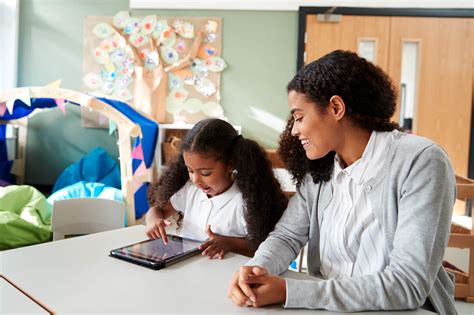Literacy Meets Technology

The intersection of literacy and technology has become a pivotal point in modern education, as the way we consume and interact with information continues to evolve. With the advent of digital tools and platforms, the traditional notion of literacy has expanded to encompass not only the ability to read and write, but also to effectively navigate and critically evaluate the vast amounts of information available online. As we delve into this complex and dynamic relationship, it becomes clear that the integration of technology into literacy education is no longer a luxury, but a necessity.
Key Points
- The concept of literacy has evolved to include digital literacy, emphasizing the ability to navigate and critically evaluate online information.
- Technology-enhanced literacy education can improve reading comprehension, writing skills, and critical thinking.
- Personalized learning experiences, facilitated by technology, can cater to individual learning styles and abilities.
- Digital tools can enhance teacher-student interaction, feedback, and assessment processes.
- Addressing the digital divide and ensuring equitable access to technology is crucial for promoting digital literacy.
Evolution of Literacy in the Digital Age

The term “literacy” was once synonymous with the ability to read and write. However, with the proliferation of digital technologies, the concept of literacy has undergone a significant transformation. Today, literacy encompasses a broad range of skills, including the ability to effectively use technology to access, evaluate, and create information. This expanded definition of literacy recognizes that the ability to navigate the digital landscape is essential for full participation in modern society. As such, educators and policymakers are increasingly focusing on the development of digital literacy skills, alongside traditional literacy skills, to ensure that individuals are equipped to thrive in an increasingly digital world.
Digital Literacy and Its Importance
Digital literacy refers to the ability to use digital technologies to access, evaluate, and create information. It involves a range of skills, including the ability to use search engines effectively, to evaluate the credibility of online sources, and to create and share digital content. Digital literacy is essential in today’s digital landscape, as it enables individuals to participate fully in online communities, to access information and services, and to develop the skills and knowledge needed to succeed in the digital economy. Moreover, digital literacy has become a critical component of modern literacy, as it enables individuals to navigate and make sense of the vast amounts of information available online.
| Digital Literacy Skills | Importance |
|---|---|
| Information searching and evaluation | Enables individuals to access and evaluate online information effectively |
| Digital content creation and sharing | Facilitates online communication, collaboration, and participation |
| Online safety and security | Protects individuals from online threats and promotes responsible digital behavior |
| Digital citizenship and etiquette | Encourages responsible and respectful online behavior |

Technology-Enhanced Literacy Education

The effective integration of technology into literacy education can have a profound impact on student outcomes. Digital tools and platforms can enhance reading comprehension, writing skills, and critical thinking, while also providing personalized learning experiences that cater to individual learning styles and abilities. Moreover, technology can facilitate teacher-student interaction, feedback, and assessment processes, enabling educators to better support student learning and development. However, it is essential to recognize that the effective use of technology in literacy education requires careful planning, implementation, and evaluation, to ensure that digital tools are used in a way that complements and enhances traditional teaching practices.
Personalized Learning Experiences
One of the key benefits of technology-enhanced literacy education is the ability to provide personalized learning experiences that cater to individual learning styles and abilities. Digital tools and platforms can offer tailored instruction, feedback, and assessment, enabling students to learn at their own pace and to focus on areas where they need improvement. Moreover, personalized learning experiences can help to address the needs of diverse learners, including those with disabilities, English language learners, and students from disadvantaged backgrounds. By providing personalized learning experiences, educators can help to promote equity, inclusion, and social justice, while also improving student outcomes and achievement.
What is digital literacy, and why is it important?
+Digital literacy refers to the ability to use digital technologies to access, evaluate, and create information. It is essential in today's digital landscape, as it enables individuals to participate fully in online communities, to access information and services, and to develop the skills and knowledge needed to succeed in the digital economy.
How can technology-enhanced literacy education improve student outcomes?
+Technology-enhanced literacy education can improve student outcomes by providing personalized learning experiences, facilitating teacher-student interaction, feedback, and assessment processes, and enhancing reading comprehension, writing skills, and critical thinking.
What are some of the challenges associated with implementing technology-enhanced literacy education?
+Some of the challenges associated with implementing technology-enhanced literacy education include addressing the digital divide, ensuring equitable access to technology, and providing professional development and support for educators to effectively integrate technology into their teaching practices.
In conclusion, the intersection of literacy and technology has become a critical area of focus in modern education. As we continue to navigate the complexities of the digital age, it is essential that we prioritize the development of digital literacy skills, alongside traditional literacy skills, to ensure that individuals are equipped to thrive in an increasingly digital world. By leveraging technology to enhance literacy education, we can promote equity, inclusion, and social justice, while also improving student outcomes and achievement. Ultimately, the effective integration of technology into literacy education requires careful planning, implementation, and evaluation, to ensure that digital tools are used in a way that complements and enhances traditional teaching practices.